Adam Peaty On Removing The Stigma Around Men’s Mental Health And His ISL Racing Return
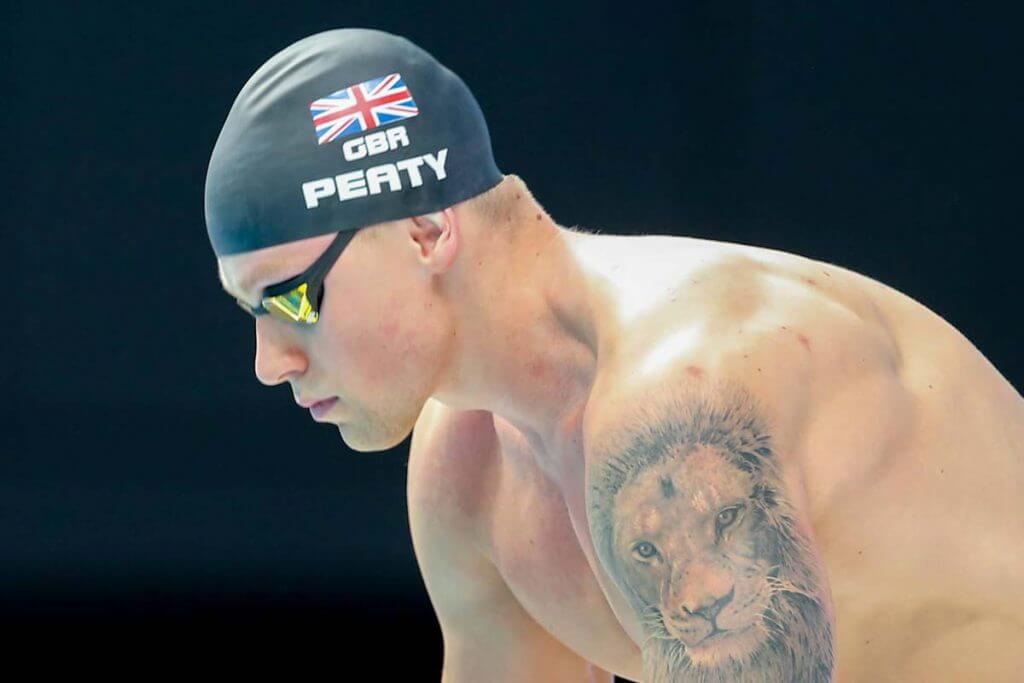
Olympic 100m breaststroke champion Adam Peaty knows all too well the stigma surrounding men’s mental health.
Up to 35% of elite athletes experience mental health issues at some stage of their careers, according to the International Olympic Committee.
Michael Phelps – with 28 medals the most decorated Olympian in history – has talked openly about the mental health struggles he has long lived with.
So, too, Allison Schmitt and Ian Thorpe. A trio boasting a total of 45 Olympic medals between them with Peaty contributing two more.
There are many factors including selection pressures, injury and setbacks as well as the post-Olympic slump.
And this year Covid-19, the long-term damage unknown but which has already had a huge physical, mental and economic impact across the world – the unprecedented postponement of the Olympics just one of the ripple effects.
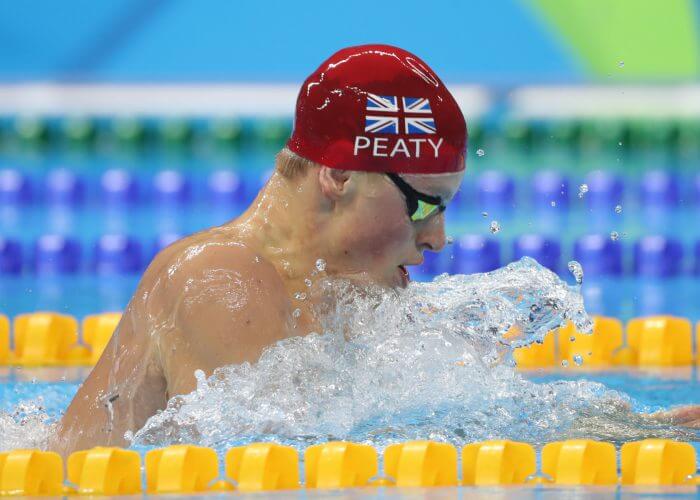
Photo Courtesy: Erich Schlegel-USA TODAY Sports
It is something Peaty experienced in 2018-19. There was the shock of his first defeat since 2014 when Cameron van der Burgh defended his 50m breaststroke gold at the 2018 Commonwealth Games.
Although the eight-time world champion returned in August that year to lower his own 100m world record to 57.10 at the European Championships in Glasgow, Scotland, his motivation waned.
The double world-record holder’s customary positive outlook, commitment and goal-setting were clouded by the depressing effect of alcohol and partying.
It was not until roughly this time 12 months ago that Peaty found himself in a good place once more – ‘Project 56’ – when he went 56.88 at the 2019 worlds – having been completed then at the tail-end of this period.
Men are far less likely than women to seek help and there is a sense of them having to prove their masculinity – to “man up” – that tears and emotion are a sign of weakness. Attitudes that would appear to be relics from bygone eras but apparently not.

Photo Courtesy: @adam_peaty
Peaty’s world has been transformed since those dark months and on 9 September 2020 he and partner Eiri Munro welcomed son George-Anderson as they became first-time parents.
But Peaty knows how vital it is that attitudes surrounding mental health are dispelled.
Marking World Mental Health Day, Peaty told Swimming World:
“You can probably write a whole book on how many stigmas there are in the world and mental health would come up on every single page – especially men’s.
“There is a massive stigma that men can’t talk about what they feel.
“I do think you want to talk to your closest circle so your partner, your best friend or your coach or whoever it’s going to be. You’ve got to talk to people and to get it off your chest because I respond really well to an issue by just saying something, just getting it off my chest and really thinking about it.
“Whether that is going on a walk or meditation, again just in a conversation, listening to music or going to the gym: people under-estimate how good exercise is for us.
“It is hard-grained into our body to exercise so you keep doing that you get endorphins and you know how it goes, it releases that good feeling. I do think people can under-estimate how good sport can be for them.”
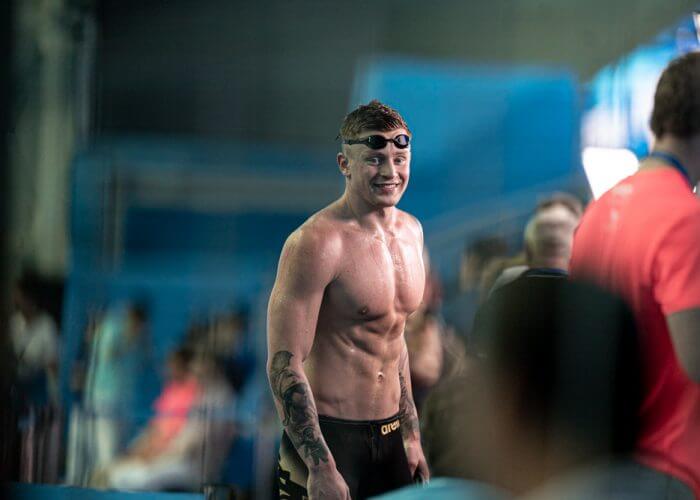
Adam Peaty. Photo Courtesy: Becca Wyant
Reflecting on his own experiences, Peaty added:
“It comes back to there being a massive stigma around it but thankfully I’m in a very good place now – a lot better than where I was.
“Probably this time last year I started to get really good but that whole 2018-2019 was kind of a hard period.
“Meeting Eiri – she has been through some stuff but for me that’s good because we can have that conversation and be honest and I think that is what men require in a sense.
“I always talk to Ed (Baxter) my business partner and I talk to Mel (coach Mel Marshall) or Eiri (partner Eiri Munro). A lot of the time women are the best people to talk to.
“I’m happy to talk about stuff to anyone but I think a lot of people – especially during lockdown – didn’t and what are the consequences of that? And that is the highest price to pay I guess with some people.”
Peaty Resets For Tokyo But Recalls Financial Struggles
When Tokyo 2020 was pushed back a year, sports psychiatrist and IOC Mental Health Working Group member Dr. Claudia Reardon likened the loss of the Games to grief.
Several athletes – Katie Ledecky and Peaty among them – accepted, adjusted and reset their goals while others like Daiya Seto struggled.
While Peaty has reset by welcoming the extra preparation time for Tokyo, he remembers all too well the effect of struggling financially.
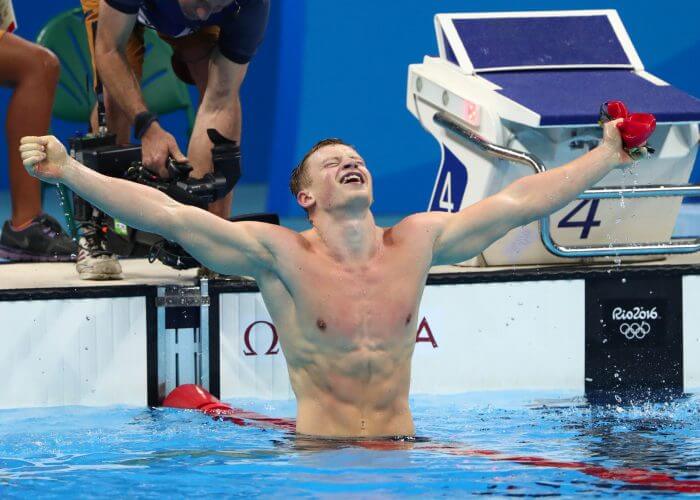
Photo Courtesy: Rob Schumacher-USA TODAY Sports
“From what I see it is annoying – you have to re-plan, restructure, retrain, periodise your training again, go through it all again.
“I just see that as a benefit for me: I get to do it all again but better. I’ve got the experience of the last seven years that I can just add on to another year.
“I love what I do and I’ve got great people who support me, great sponsors who support me, and I’m in a fortunate position to have those sponsors so I don’t have to worry about the money side of things or the marketing side of things.
“I’ve got a great team at British Swimming, I’ve got a great team at home, and obviously Mel and management.
“So everything for me is okay but a lot of athletes don’t have that, don’t have that comfort and are like ‘how am I going to pay my next bill?’
“I’ve been there. I’ll always remember what it was like to be an athlete that couldn’t afford petrol, couldn’t afford to go away on trips.
“But that’s not me now so I can’t understand what it would be like through a lockdown like that.”
Peaty Ready To Roar As ISL Resumes
Peaty will compete for the first time since the Edinburgh International Swim Meet in March when the International Swimming League gets under way on 16 October.
Ten teams will compete in Budapest, Hungary, over five weeks with the semi-finals scheduled for 19-20 November with the location and date of the final yet to be announced.
The eight-time world champion will again represent London Roar who narrowly lost out to Energy Standard in the grand finale in Las Vegas last December.
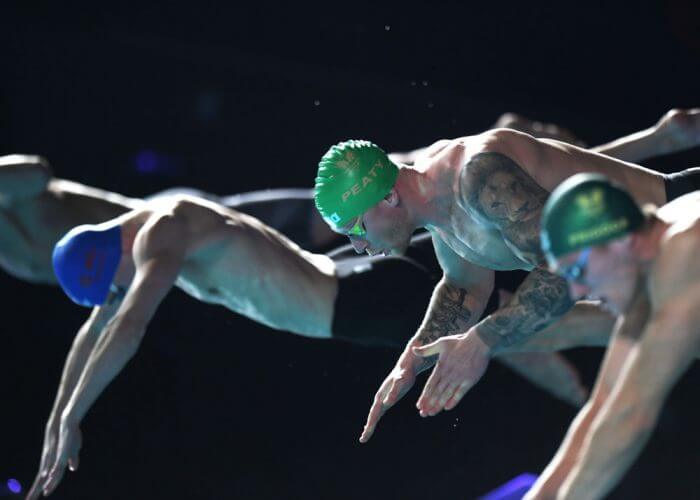
Peaty has long been a vocal supporter of the ISL and he welcomed the opportunity to race once more and especially in a team environment where every point counts.
He said:
“I don’t want to let my team down.
“Just because you’re there for racing and training – some people might be there just to race – every athlete is different.
“I never want to let my team down, let Mel down or let Rob down (London Roar general manager Rob Woodhouse) so it’s just giving my absolute best really and enjoying it and really being grateful that we even get the chance to compete.
“Just that alone is a massive welcome addition because we did some stand-ups at the end of July in Loughborough but other than that we haven’t raced.
“So it’s very needed: I respond very well to different stimulus and a variation of training so it is going to be nice.”
Advertising: Shop At Swim360



